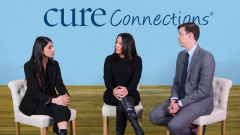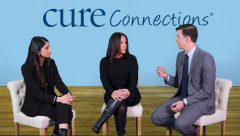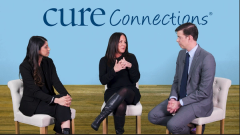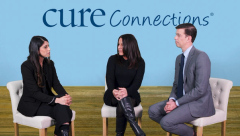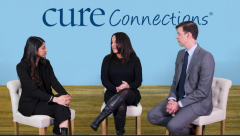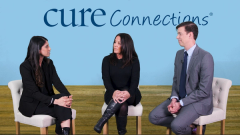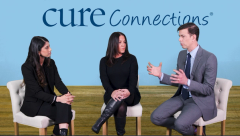
Advice for Caregivers, from a Caregiver
Danielle Hicks, a patient advocate, details her journey as a caregiver for her mother and provides advice for other caring for loved ones with lung cancer. Sponsored by Bristol Myers Squibb.
Episodes in this series

Danielle Hicks: Now, I'd like to offer some advice for caregivers having been a caregiver to my mom. Anyone caring for a loved one with non-small cell lung cancer has a lot to learn. Just, you know, they're walking the walk with their person. I want to share a little bit about my journey as a caregiver. My mom was diagnosed with stage IIIB non-small cell lung cancer in 2003. I became a caregiver at the very onset of her diagnosis and it was one of the most terrifying things I had ever faced. The hardest part about it was here was my mom, who had been the matriarch of our family. She was the caregiver. She was the one, you know, bossing everybody around all the time. And I had these terrible fears that my youngest son was not going to remember her, that the Sunday dinners that were tradition in my extended family were going to, you know, come to an end. And, it just didn't sit right with any of us. She was someone that was there with us through the good times and the bad. She was our rock and it was really my turn, and our collective turn, my siblings and I, to be that rock for her. Some days were harder than others. She would often hide how she was truly feeling with forced laughter or a smile. Throughout all of this, even though it wasn't easy, being a part of her care team was a beautiful experience, and I really found my reason and my passion. What I experienced when my mom was first diagnosed was that, I had a hard time finding a single resource that was credible, up-to-date, easy-to-understand on my mom's specific diagnosis. And even today, caregivers that I talk to, and people diagnosed may still feel confused about where to find this information. I learned several important lessons that might be useful to caregivers, loved ones, or close friends. First, be an emotional support to the person diagnosed. Listening is more important than speaking when someone truly needs you. They may experience a range of emotions such as fear, confusion, anger, and sadness. Give them time to absorb the news and avoid rushing them into making any immediate decisions. Second, act as an advocate. Offer to go to doctors’ appointments with them and take notes, do research and ask questions about diagnosis and treatment. Help them wrap their brain around complex medical information. Third, pivot. As my mom, her wants and needs changed throughout her cancer journey, I adjusted and used different strategies to help her based on what she was going through at that time. For example, when she did not feel like smiling, we’d bring in her grandchildren as a reminder that there was always a reason to smile. Any additional advice from you two for caregivers?
Dr. Christopher Towe: Yeah, I'd like to add it's important to accept help and take care of yourself as a caregiver. You know, being a caregiver is hard. I see the wear and tear on the families of my patients and even as a caregiver, you can't do it alone. You need to accept help yourself and when someone offers for it, you take it. And find that community of caregivers even to help support your journey. And, there are communities, either locally or online, to provide that support. And, you know, if you have emotions you can get professional help. It's not a sign of weakness. It's a sign of strength.
Dr. Nisha Mohindra: I think this is truly something that takes a village and a village for all of us. You have communities built in through family, friends, care teams, online communities. And I think you said it so nicely, it's important to listen first and to pivot when your loved one is telling you it's time to change direction.

